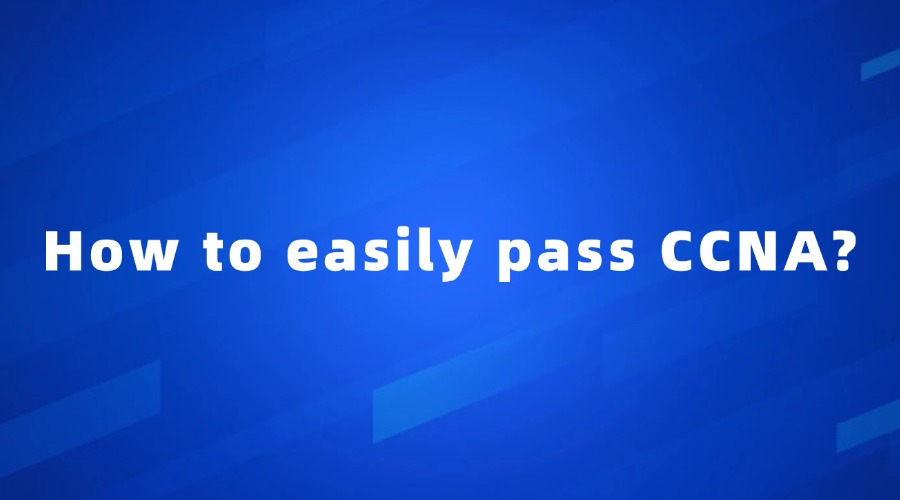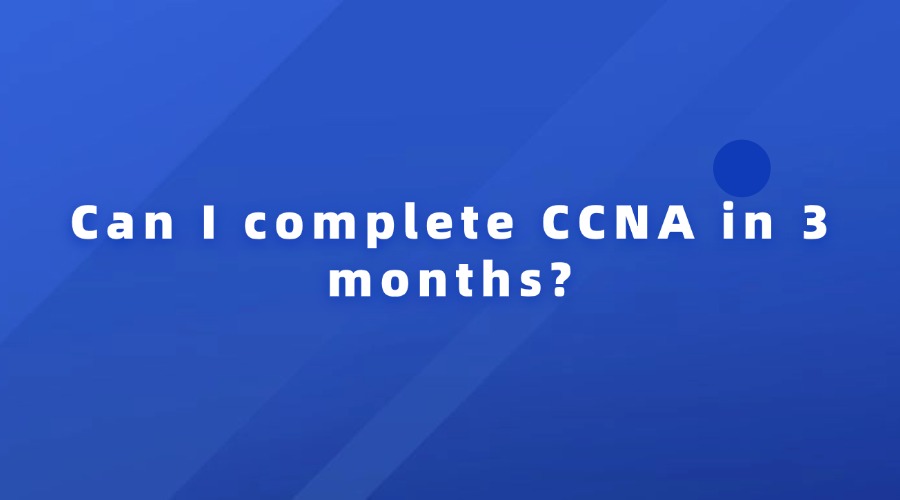Is CCNP multiple choice?
Update time:2024-10-28
The Cisco Certified Network Professional (CCNP) certification is a highly sought-after credential for networking professionals looking to advance their careers. It demonstrates proficiency in networking technologies and validates an individual’s ability to plan, implement, verify, and troubleshoot local and wide-area enterprise networks. One of the common questions candidates ask is, “Is the CCNP exam multiple choice?” The short answer is yes, but it is more than just a simple multiple-choice exam. This article will explore the structure of the CCNP exam, including the question types, the skills it assesses, and the preparation strategies you need to succeed.

Overview of the CCNP Certification Exam Structure
The CCNP certification requires candidates to pass two exams: a core exam and a concentration exam. Each of these exams includes a variety of question types, with multiple-choice being one of the primary formats. However, the exam also incorporates other formats that require a deeper understanding of the concepts being tested.
Here’s a breakdown of the structure:
1. Core Exam: The core exam covers the foundational technologies of your chosen CCNP track, such as enterprise infrastructure, security, or data center. It typically includes 90 to 120 questions and is designed to test your broad knowledge of networking technologies. This exam costs $400.
2. Concentration Exam: The concentration exam allows you to specialize in a specific area, such as advanced routing, network security, or wireless. It typically consists of 60 to 90 questions, and the exam cost is $300.
Each exam is 90 minutes long and includes a variety of question types that evaluate both theoretical and practical knowledge.
Types of Questions on the CCNP Exam
While the CCNP exam does include multiple-choice questions, it also features other formats that challenge candidates to apply their knowledge in real-world scenarios. The types of questions you can expect include:
1. Multiple-Choice Questions: These are the most common type of questions on the CCNP exam. Multiple-choice questions can be single-answer or multiple-answer. For single-answer questions, you are required to choose one correct option from a list of choices. For multiple-answer questions, you must select all the correct options from a list. These questions test your knowledge of networking concepts, protocols, and configuration details.
2. Drag-and-Drop Questions: In these questions, you will be asked to match terms, protocols, or concepts by dragging items from one area of the screen to another. This format tests your ability to understand relationships between different networking technologies or steps in a configuration process.
3. Simulations: Simulations are designed to test your practical skills. You will be presented with a virtual network environment and a problem scenario. You are required to configure routers, switches, or other network devices to resolve the issue. These questions test your ability to troubleshoot, configure, and manage networks in real-world situations.
4. Simlets: Simlets are similar to simulations but with a twist. Instead of fully configuring or troubleshooting a network, you are given a simulated environment where certain sections of the configuration are already completed. Your task is to analyze the network and answer specific questions related to the setup, such as identifying a misconfiguration or determining the correct protocol to use.
5. Testlets: Testlets consist of a scenario followed by several related questions. The scenario will describe a network environment or problem, and the subsequent questions will require you to analyze the scenario and answer accordingly. This format is designed to test your ability to understand and apply networking concepts in a holistic way.
Contact me immediately to get the golden key helping you fast express your certificate.
Why Are Multiple Formats Used?
Cisco uses multiple question formats in the CCNP exam to assess a broad range of skills. While multiple-choice questions are effective at testing theoretical knowledge, they may not fully capture a candidate’s practical abilities. Networking professionals must have both the knowledge and the hands-on skills to manage, configure, and troubleshoot networks in real-world environments.
By incorporating simulations, simlets, and drag-and-drop questions, Cisco ensures that candidates are not only familiar with the theoretical aspects of networking but can also apply their knowledge in real-world scenarios. These formats also help to assess problem-solving skills, critical thinking, and the ability to analyze and implement complex solutions.
Skills Assessed by the CCNP Exam
The CCNP exam is designed to test a wide range of skills that are crucial for networking professionals. Some of the key skills assessed by the exam include:
1. Networking Protocols: Candidates must have a deep understanding of networking protocols such as OSPF, EIGRP, BGP, and MPLS. These protocols are used to manage and route data across large-scale networks, and the exam tests your knowledge of how to configure and troubleshoot them.
2. Security: In the age of cybersecurity threats, network security is a critical skill. The CCNP exam assesses your ability to implement security measures, configure firewalls, and protect networks from various threats.
3. Automation and Programmability: With the rise of network automation, the CCNP exam now includes questions on automation tools and concepts like Python, APIs, and Cisco’s DevNet. You will be tested on your ability to use these tools to automate network tasks and improve efficiency.
4. Troubleshooting: One of the most important skills for any network professional is troubleshooting. The CCNP exam includes questions that require you to diagnose and resolve network issues, whether it’s a configuration error, a misconfigured protocol, or a hardware failure.
5. Enterprise Networking: The core exam focuses on enterprise networking, including concepts like network infrastructure, architecture, and services. You will be tested on how to design, implement, and manage enterprise-level networks.
How to Prepare for the CCNP Exam
Given the variety of question types and the advanced level of knowledge required, proper preparation is crucial for success on the CCNP exam. Here are some tips to help you prepare:
1. Understand the Exam Blueprint: Cisco provides a detailed exam blueprint for each CCNP exam, outlining the topics that will be covered. Review this blueprint carefully and make sure you are familiar with all the key concepts and skills.
2. Use Multiple Study Resources: Don’t rely on just one resource for your preparation. Use Cisco’s official study guides, online courses, lab simulations, and practice exams to ensure you have a comprehensive understanding of the material.
3. Practice with Labs: Hands-on practice is essential for success on the CCNP exam, especially for the simulation and simlet questions. Set up your own lab environment or use virtual labs to practice configuring and troubleshooting network devices.
4. Take Practice Exams: Practice exams are a great way to familiarize yourself with the format and types of questions you will encounter on the CCNP exam. They also help you identify areas where you may need further study.
5. Join Study Groups: Joining a study group or online forum can provide valuable insights and help you stay motivated during your preparation. Networking with other candidates can also help you gain different perspectives on the material.
Conclusion
While the CCNP exam does include multiple-choice questions, it is not limited to this format. The exam also features drag-and-drop, simulation, simlet, and testlet questions, which are designed to test a wide range of skills. These question formats ensure that candidates not only have a solid understanding of networking concepts but can also apply their knowledge in real-world scenarios. To succeed on the CCNP exam, candidates must be well-prepared, with both theoretical knowledge and hands-on experience. With proper preparation, earning a CCNP certification can open the door to advanced career opportunities in the networking field.
I'm your man who have the 100% valid dumps , buy it now for 50% off to clear your exam!
Click it ↓↓

Overview of the CCNP Certification Exam Structure
The CCNP certification requires candidates to pass two exams: a core exam and a concentration exam. Each of these exams includes a variety of question types, with multiple-choice being one of the primary formats. However, the exam also incorporates other formats that require a deeper understanding of the concepts being tested.
Here’s a breakdown of the structure:
1. Core Exam: The core exam covers the foundational technologies of your chosen CCNP track, such as enterprise infrastructure, security, or data center. It typically includes 90 to 120 questions and is designed to test your broad knowledge of networking technologies. This exam costs $400.
2. Concentration Exam: The concentration exam allows you to specialize in a specific area, such as advanced routing, network security, or wireless. It typically consists of 60 to 90 questions, and the exam cost is $300.
Each exam is 90 minutes long and includes a variety of question types that evaluate both theoretical and practical knowledge.
Types of Questions on the CCNP Exam
While the CCNP exam does include multiple-choice questions, it also features other formats that challenge candidates to apply their knowledge in real-world scenarios. The types of questions you can expect include:
1. Multiple-Choice Questions: These are the most common type of questions on the CCNP exam. Multiple-choice questions can be single-answer or multiple-answer. For single-answer questions, you are required to choose one correct option from a list of choices. For multiple-answer questions, you must select all the correct options from a list. These questions test your knowledge of networking concepts, protocols, and configuration details.
2. Drag-and-Drop Questions: In these questions, you will be asked to match terms, protocols, or concepts by dragging items from one area of the screen to another. This format tests your ability to understand relationships between different networking technologies or steps in a configuration process.
3. Simulations: Simulations are designed to test your practical skills. You will be presented with a virtual network environment and a problem scenario. You are required to configure routers, switches, or other network devices to resolve the issue. These questions test your ability to troubleshoot, configure, and manage networks in real-world situations.
4. Simlets: Simlets are similar to simulations but with a twist. Instead of fully configuring or troubleshooting a network, you are given a simulated environment where certain sections of the configuration are already completed. Your task is to analyze the network and answer specific questions related to the setup, such as identifying a misconfiguration or determining the correct protocol to use.
5. Testlets: Testlets consist of a scenario followed by several related questions. The scenario will describe a network environment or problem, and the subsequent questions will require you to analyze the scenario and answer accordingly. This format is designed to test your ability to understand and apply networking concepts in a holistic way.
Contact me immediately to get the golden key helping you fast express your certificate.
Why Are Multiple Formats Used?
Cisco uses multiple question formats in the CCNP exam to assess a broad range of skills. While multiple-choice questions are effective at testing theoretical knowledge, they may not fully capture a candidate’s practical abilities. Networking professionals must have both the knowledge and the hands-on skills to manage, configure, and troubleshoot networks in real-world environments.
By incorporating simulations, simlets, and drag-and-drop questions, Cisco ensures that candidates are not only familiar with the theoretical aspects of networking but can also apply their knowledge in real-world scenarios. These formats also help to assess problem-solving skills, critical thinking, and the ability to analyze and implement complex solutions.
Skills Assessed by the CCNP Exam
The CCNP exam is designed to test a wide range of skills that are crucial for networking professionals. Some of the key skills assessed by the exam include:
1. Networking Protocols: Candidates must have a deep understanding of networking protocols such as OSPF, EIGRP, BGP, and MPLS. These protocols are used to manage and route data across large-scale networks, and the exam tests your knowledge of how to configure and troubleshoot them.
2. Security: In the age of cybersecurity threats, network security is a critical skill. The CCNP exam assesses your ability to implement security measures, configure firewalls, and protect networks from various threats.
3. Automation and Programmability: With the rise of network automation, the CCNP exam now includes questions on automation tools and concepts like Python, APIs, and Cisco’s DevNet. You will be tested on your ability to use these tools to automate network tasks and improve efficiency.
4. Troubleshooting: One of the most important skills for any network professional is troubleshooting. The CCNP exam includes questions that require you to diagnose and resolve network issues, whether it’s a configuration error, a misconfigured protocol, or a hardware failure.
5. Enterprise Networking: The core exam focuses on enterprise networking, including concepts like network infrastructure, architecture, and services. You will be tested on how to design, implement, and manage enterprise-level networks.
How to Prepare for the CCNP Exam
Given the variety of question types and the advanced level of knowledge required, proper preparation is crucial for success on the CCNP exam. Here are some tips to help you prepare:
1. Understand the Exam Blueprint: Cisco provides a detailed exam blueprint for each CCNP exam, outlining the topics that will be covered. Review this blueprint carefully and make sure you are familiar with all the key concepts and skills.
2. Use Multiple Study Resources: Don’t rely on just one resource for your preparation. Use Cisco’s official study guides, online courses, lab simulations, and practice exams to ensure you have a comprehensive understanding of the material.
3. Practice with Labs: Hands-on practice is essential for success on the CCNP exam, especially for the simulation and simlet questions. Set up your own lab environment or use virtual labs to practice configuring and troubleshooting network devices.
4. Take Practice Exams: Practice exams are a great way to familiarize yourself with the format and types of questions you will encounter on the CCNP exam. They also help you identify areas where you may need further study.
5. Join Study Groups: Joining a study group or online forum can provide valuable insights and help you stay motivated during your preparation. Networking with other candidates can also help you gain different perspectives on the material.
Conclusion
While the CCNP exam does include multiple-choice questions, it is not limited to this format. The exam also features drag-and-drop, simulation, simlet, and testlet questions, which are designed to test a wide range of skills. These question formats ensure that candidates not only have a solid understanding of networking concepts but can also apply their knowledge in real-world scenarios. To succeed on the CCNP exam, candidates must be well-prepared, with both theoretical knowledge and hands-on experience. With proper preparation, earning a CCNP certification can open the door to advanced career opportunities in the networking field.
I'm your man who have the 100% valid dumps , buy it now for 50% off to clear your exam!
Click it ↓↓
Previous:How much does it cost to do CCNP?
Next:Is CCNP a hard exam?














